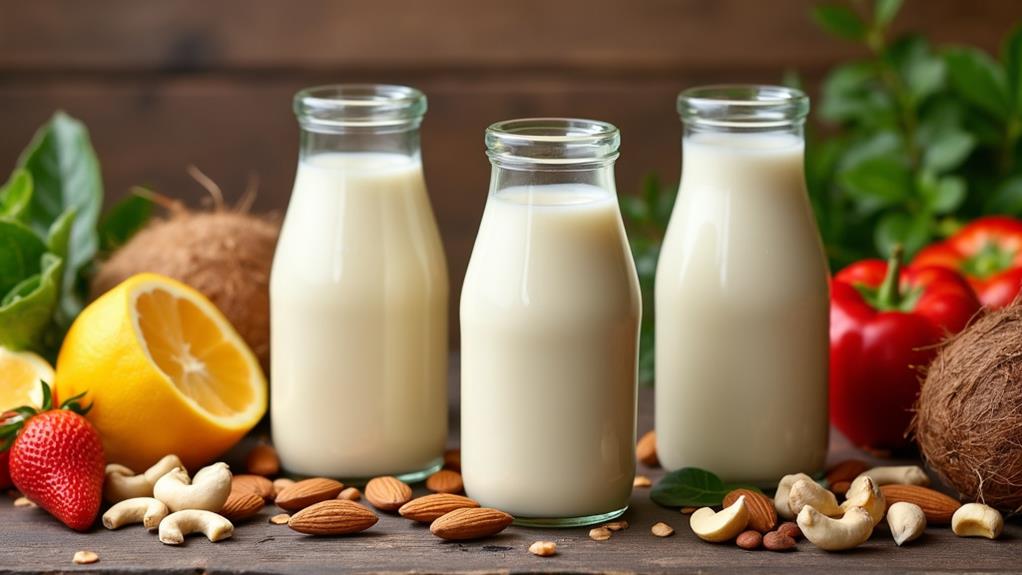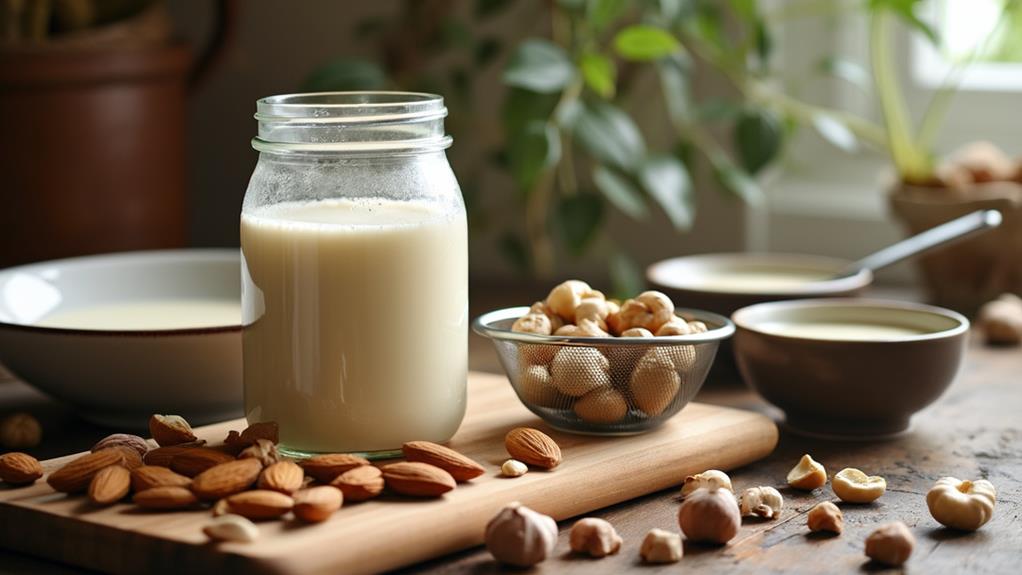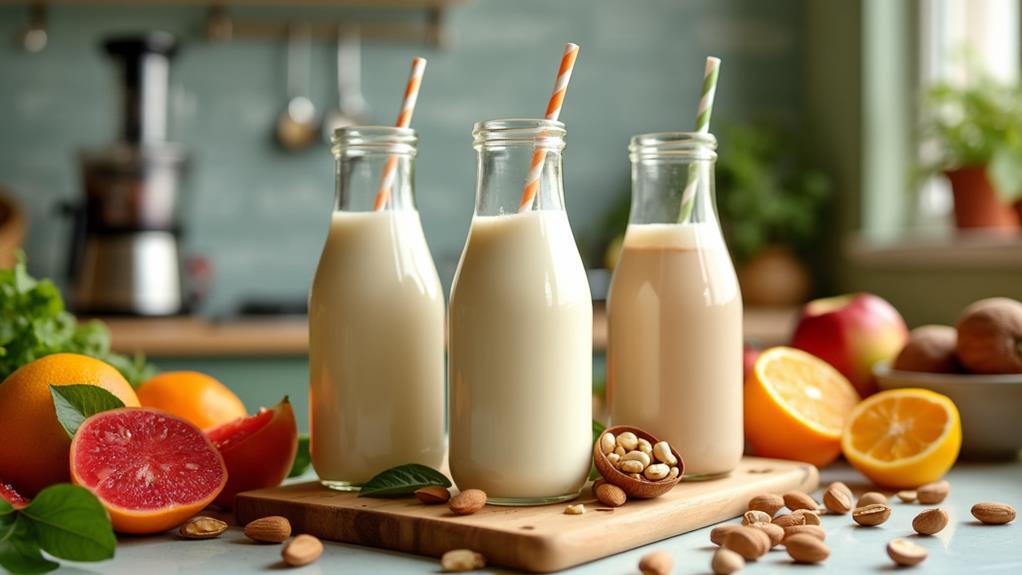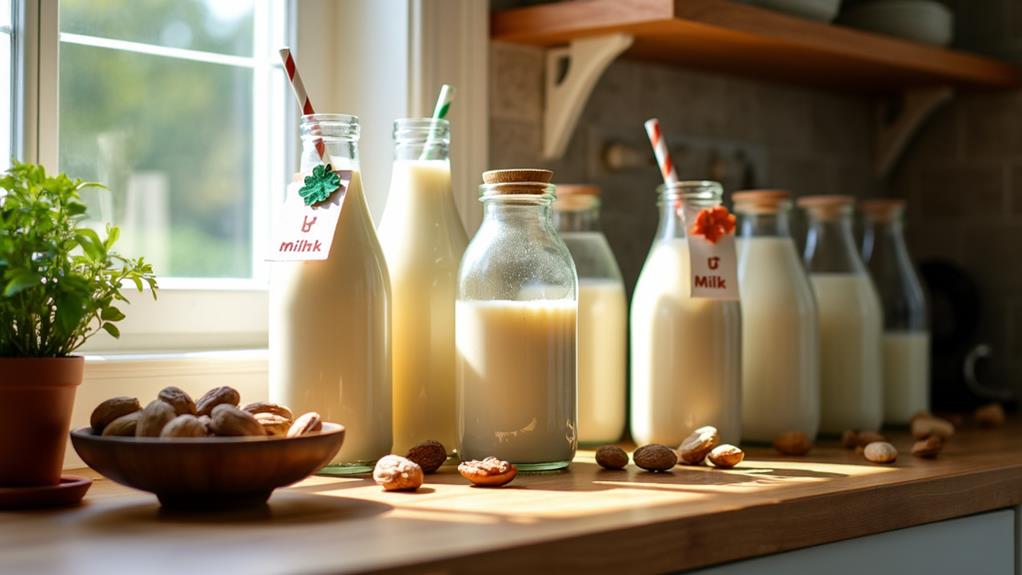Top Nut Milks for Juicing: A Simple Guide

Uncovering the right nut milks can take your juicing to a new level. Almond and cashew milks are top picks for their creamy textures and natural sweetness, perfect for crafting delicious juices. Packed with vital vitamins and healthy fats, these nut milks offer a nutrient-rich, low-calorie alternative to traditional dairy. Soak your nuts overnight and blend with water for the freshest flavor. Spice things up with vanilla or cocoa, and enjoy over five days if stored properly. With options like pecan and walnut milk, you can experiment with a variety of tastes. There's plenty more to investigate in nut milk juicing.
Benefits of Nut Milk
Nut milk frequently stands out as a nutritious alternative to dairy milk, offering a rich source of essential vitamins and minerals like vitamin E, magnesium, and calcium that improve general health. When you choose nut milk, you're opting for a nutrient-rich, plant-based milk that caters to a variety of dietary needs. It's an excellent choice if you have lactose intolerance or dairy allergies, as it provides a comforting, dairy-free milk option without sacrificing taste or nutrition.
One of the standout benefits of homemade nut milk is its purity. By making your own, you can avoid additives, preservatives, and sweeteners that are often present in store-bought options. This makes homemade nut milk a cleaner, more natural choice. Almond milk and cashew milk, in particular, are popular due to their creamy texture and healthy fats, all while being lower in calories than traditional dairy milk.
Nut milk's versatility allows you to incorporate it into smoothies, cereals, or enjoy it as a standalone beverage. By doing so, you can improve the nutritional profile of your meals and drinks, making it an essential part of a health-conscious lifestyle.
Best Nuts for Milk
Choosing the right nuts can improve your homemade nut milk, giving it the perfect balance of flavor and nutrition. Almonds are a popular choice for non-dairy milk, offering a light sweetness and low-calorie content. They're adaptable, fitting seamlessly into different recipes. If you're after a creamy nut milk, cashews are your go-to. They yield a rich texture and a slightly sweet flavor, working well in both sweet and savory dishes.
For a more distinct taste, hazelnuts are ideal. Their unique flavor pairs beautifully with chocolate, making them a fantastic option for dessert-based plant milk beverages. Don't overlook walnuts; they're an underrated pick for nut milk. Their rich, buttery taste combines with beneficial omega-3 fatty acids and antioxidants, elevating your homemade nut milk to a nutritious delight.
Pecans, with their naturally sweet flavor, are another excellent choice. They're a good source of healthy fats, making them perfect for adding to smoothies or coffee. Each of these nuts brings something special to the table, ensuring that your nut milk not only tastes great but also packs a nutritious punch.
Preparing Your Nuts

To make the best nut milk, start by soaking fresh raw nuts like almonds, cashews, or walnuts in filtered water for 4-6 hours or overnight. This soaking process improves their texture and digestibility, setting the stage for a delicious nut milk. Once the nuts are soaked, rinse them thoroughly to remove any impurities. This guarantees your nut milk has the finest flavor and quality.
Next, use a 1:1 ratio of soaked nuts to water for a balanced consistency. If you like your nut milk creamier, adjust the ratio to suit your preference. Blend the soaked nuts on high speed until smooth for that creamy texture. The blending process is essential to breaking down the nuts into a silky mixture.
To achieve a smoother final product, strain the blended mixture through a nut milk bag or cheesecloth. This step separates the milk from the pulp, completing the preparation of your nuts for a fantastic nut milk recipe.
- Soak your nuts in filtered water for ideal texture.
- Rinse soaked nuts to eliminate impurities.
- Blend thoroughly for a creamy texture.
- Strain using a nut milk bag.
- Adjust nut-to-water ratio for desired creaminess.
Making Nut Milk
Crafting your own nut milk is a simple and rewarding process that opens up a world of flavor and nutrition. Start by soaking the nuts in filtered water for 4-6 hours or overnight. This step is essential to improve both digestibility and texture. Once your nuts are ready, drain and rinse them, then blend with fresh filtered water. The ratio can vary from 1:1 to 1:1.5, depending on how creamy you want your milk. For creamier milk, try using a 1:1 ratio of nuts to water. If you prefer a lighter version, go for a 1/4 cup of nuts to 1 cup of water.
After blending until smooth, strain the mixture using a nut milk bag or cheesecloth to separate the milk from the pulp. This will leave you with pure, silky homemade nut milk. You can experiment with flavor options by adding sweeteners like honey or maple syrup, or extracts like vanilla after blending. Remember to store your nut milk in airtight glass containers in the refrigerator, where it will stay fresh for 4-5 days. For convenience, consider freezing any excess in ice cube trays to use later. Enjoy your freshly made creation!
Juicing With Nut Milk

Imagine transforming your usual juice blends into rich, creamy delights with the inclusion of nut milk. Nut milk serves as a creamy base for your juice blends, enhancing both texture and nutrition without the need for dairy. Using homemade nut or seed milk, you can enjoy fresh, nutrient-rich beverages tailored to your personal preference. Start by soaking nuts like almonds, cashews, or hazelnuts overnight, which helps soften them for blending. After soaking, blend the nuts in a high-speed blender with water to make creamy milk. The typical ratio is 1 cup of nuts to 1-1.5 cups of water for ideal creaminess.
When juicing with nut milk, remember:
- Use fresh homemade nut milk for the best flavor and nutrition.
- Experiment with different nut milks, like almond or cashew, for unique flavors.
- Consider flavored nut milk by adding vanilla or cocoa for a delightful twist.
- Store nut milk in the fridge for up to 4-5 days to keep it fresh.
- Adjust the nut-to-water ratio to suit your personal preference for creaminess.
Adding nut milk to your juices can enhance your experience, turning ordinary blends into satisfying, creamy drinks.
Flavoring Options
Enhancing your nut milk with a variety of flavoring options can turn a simple drink into a delightful treat. Start by exploring nut milk recipes that incorporate vanilla extract. Just one tablespoon per cup can enrich your drink with a rich, aromatic profile. If you're a chocolate lover, adding cocoa powder or raw cacao will transform your nut milk into a delicious chocolaty beverage.
For those who prefer a naturally sweetened drink, honey or maple syrup are excellent choices. Adding 1-2 tablespoons can balance out the nutty flavor without overpowering it. If you're looking for a cozy, comforting twist, spices like cinnamon or nutmeg can be your secret ingredients. These spices are perfect for creating warm, seasonal beverages.
Don't forget about the power of fresh fruit purees. Blending fruits like strawberries or blueberries into your nut milk not only adds a fruity twist but also elevates the nutritional value with extra vitamins and antioxidants. With these flavoring nut milk options, you can customize your drink to suit your taste and mood, turning every sip into a unique experience.
Storage Tips

Proper nut milk storage is key to maintaining its freshness and taste. When you make homemade nut milk, always store it in clean glass jars with airtight lids. This preserves the milk's quality in the refrigerator for about 4-5 days. Be certain to check it visually and smell it for any signs of spoilage. For longer storage, consider freezing surplus nut milk in ice cube trays. This makes it easy to portion out and use in smoothies or recipes when needed. Avoid storing your nut milk in plastic containers, as they can leach chemicals that might affect the taste and quality.
Before using your nut milk, always shake or stir it because separation is natural without stabilizers. To extend shelf life and prevent rancidity, ascertain that the nuts you use are fresh and properly stored before soaking and blending. Here are some quick storage tips to help you out:
- Use glass jars for storing nut milk.
- Check for spoilage regularly.
- Freeze surplus milk in ice cube trays.
- Shake or stir before each use.
- Start with fresh nuts for the best results.
Following these tips will keep your nut milk fresh and delicious.
Creative Uses
Nut milks offer a versatile and creamy alternative to traditional dairy, opening up a world of creative culinary possibilities. Imagine starting your day with a smoothie using nut milk as a creamy base. By blending nuts and water, you create a homemade milk that's high in protein and packed with healthy fats. This not only improves the smoothie's flavor but also its nutritional value. For coffee or tea lovers, nut milk provides a rich, dairy-free alternative. Add a splash of vanilla or cocoa for extra flavor, transforming your morning brew into a delightful treat.
Incorporating nut milk into your breakfast routine is also a game-changer. Pour it over oatmeal or cereal for a nutty taste and a protein enhancement. It brings creaminess without the dairy, making your meal both satisfying and nutritious. For cooking, use nut or seed milk as a base for sauces and soups. Its rich texture raises dishes, offering a depth of flavor. Don't forget to freeze nut milk into cubes. Blend these into desserts like sorbets or smoothies, creating a chilled, creamy consistency. By soaking nuts and using a blender, you've got endless options at your fingertips.




